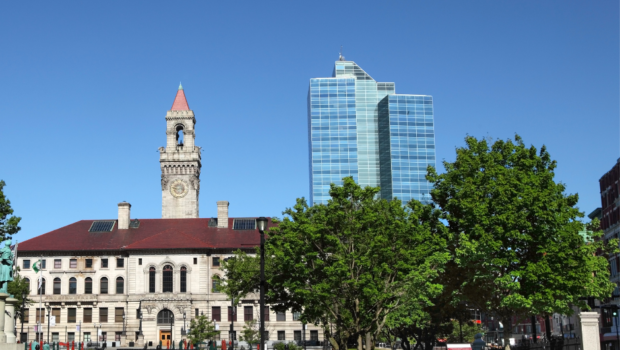Is Worcester ready for another hike in our property taxes with the Community Preservation Act?
By: Alex Guardiola, Vice President of Government Affairs and Public Policy
Earlier this year, a coalition of city residents requested that the City Council approve an order that will allow Worcester voters to determine if the city should adopt the Community Preservation Act (CPA) by a binding question on the November 8th ballot. At that hearing, the city council approved the order 7 votes to 3 allowing the question on the ballot. While there have been attempts in the past to get the CPA on the ballot here in the city, this November will be the first time Worcester residents will be able to decide whether or not to implement it in the second biggest city in New England.
Worcester voters will be voting on whether to adopt a 1.5% surcharge with exemptions for the first $100,000 of residential and commercial properties and for low-income households and some seniors who qualify for a low-income exemption. It is argued by proponents that the city could raise approximately $3.6 million annually for historic preservation, outdoor recreation, open space, and community housing.
If the CPA is passed it allows Worcester to join the state’s Community Preservation Trust Fund. Currently, there are 189 municipalities in the Commonwealth, or approximately 54 percent of all communities that have adopted the CPA. Moreover, of the 26 Gateway cities in Massachusetts, only 13 have adopted the CPA to date. Seven of these communities have opted for a surcharge of 1%, five have a 1.5% surcharge and only one city has a surcharge of 3%. Further, while only half of the State’s Gateway Cities have adopted the CPA, just three of Worcester’s neighbors have implemented it here in Central Massachusetts: Grafton, Shrewsbury, and West Boylston.
While initiatives that CPA collected funds would be applied to sound good in theory, what does it mean to the average taxpayer here in the city of Worcester?
As proposed, Worcester property owners will add a 1.5% surcharge to their assessed tax levy.
There would be an exemption for the first $100,000 of residential and commercial property and for low-income households and low and moderate-income seniors. For businesses, this would be an average surcharge on the already 8th highest commercial tax rate in Commonwealth of $604.58 per year.
To put this into perspective, I go back to last year’s tax classification vote: there was a heated debate over an increase in the yearly property tax payments from both the residential and commercial taxpayers. After testimony from both sides stating that these increases would have a negative impact on the affordability to live and work in Worcester, a final tax line was voted on. In the end, with the new property assessments, the increase for the average residential taxpayer was $105 per year and the average commercial tax increase was $143 per year. We are now talking about adding another $44.45 per year for the average residential taxpayer and $604.58 per year for the average commercial taxpayer if the CPA is passed.
Inflation rates continue to climb, rents in Worcester are at an all-time high, the cost of building supplies is making projects unaffordable, and filling up a car or work truck is affecting residents and small businesses alike. Moreover, we continue to hear the same common denominator across all sectors of the economy: work shortages and supply chain issues. Adding these costs together with new proposed property tax increases is not the right policy for Worcester at this time, especially when there is an influx of federal money sitting in city and state treasuries.
Currently, we have a historic amount of dollars available to both residents and businesses through the American Rescue Plan Act (ARPA) on both the city and state levels. Through the act, the city of Worcester received $149 million to address many of the same initiatives that the CPA is proposing to address. There is $15,000,000 already allocated for the Affordable Housing Trust Fund.
Couple those funds with the Inclusionary Zoning proposal that the Chamber is advocating for, this creates a continuous stream of funding going forward and will accomplish many of the things the CPA hopes to do. There is also $10,525,000 for park capital improvements earmarked under the city’s ARPA fund allocations, $12,966,624 in Technology upgrade dollars, and $10,313,615 that is available to allocate as needed.
Moreover, in 2021 Congress sent over $5.3 billion in ARPA funds to the Commonwealth of Massachusetts to invest in our economic recovery, jobs, and sustainability. Last December Governor Baker signed a $4 billion American Rescue Plan Act and surplus tax revenue spending bill. The bill deploys $2.55 billion in ARPA money and $1.45 billion in fiscal 2021 surplus state tax revenue while preserving a little more than $2.3 billion in federal ARPA funds for future use. ARPA money must be committed by the end of 2024 and spent by the end of 2026. The bill will allocate $624 million in housing across the Commonwealth, will put $414 million into infrastructure upgrades, $389 million into education, $267 million into economic development, and $500 million into workforce initiatives.
There is also $25 million to plant trees on public, private, and nonprofit lands to sequester and store carbon, manage stormwater, and reduce urban flooding, while insulating homes thereby creating lower energy demand and reducing greenhouse gas emissions.
Furthermore, $15 million has been allocated to conserve forests, wetlands, farms, and other natural resources and improve state parks; including grants to nonprofits to create new outdoor recreational opportunities, especially in urban areas, and to benefit those disproportionately impacted by COVID-19. There is also $14 million for agricultural needs including improving soil health and increasing carbon sequestration and resilience on farms.
While the Chamber supports the goals of affordable housing, more green space, and the preservation of historic buildings, 2022 is not the right time to add more taxes to homeowners and businesses. We continue to talk about workforce shortage as a common factor across all industries; is taking money out of the pockets of those who want to hire the right message?
A property tax increase is a disincentive to those we look to for employment, sponsorships, and support for many worthy causes in the City. We continue to see businesses leave the city to neighboring communities because of our dual tax rate, now we are going to add surcharges for projects and initiatives that can be addressed by the federal dollars that are earmarked for the same initiatives the CPA seeks to focus on if passed.
The Worcester Regional Chamber of Commerce is not opposed to the goals of the CPA, however, we believe that with the inflow of dollars that the city and state are both currently sitting on, increases in property taxes for our hard-working residents and businesses is not a responsible policy at this time.





